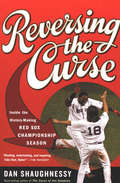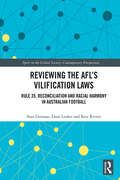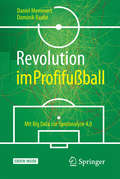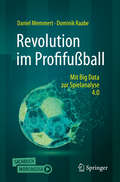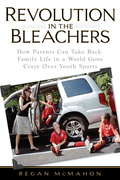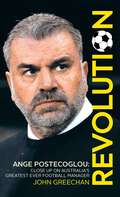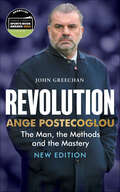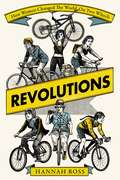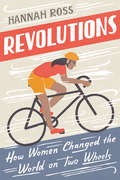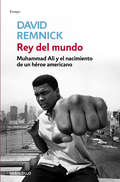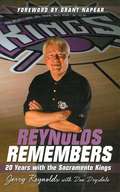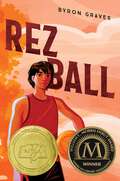- Table View
- List View
Reversing the Curse: Inside the 2004 Boston Red Sox
by Dan Shaughnessy&“A true insider&’s perspective on the 2004 Red Sox&” and their World Series win, from the bestselling author of Curse of the Bambino (USA Today). On October 27, 2004, the Red Sox won their first World Series Championship in eighty-six years—breaking the infamous Curse of the Bambino and giving diehard fans the thrill of a lifetime. Reversing the Curse preserves one of the greatest stories in sports history with an absorbing account of the team—a raggedy lineup of motorcycle-riding, whiskey-drinking rogues—and the key events that led to their incredible championship victory. A more epic sports saga could not have been invented: Here we have the curse that began with Babe Ruth; a team of comeback kids determined to prove their mettle; the perennial rivalry against the Yankees; and a historic win that was celebrated around the world. Dan Shaughnessy captures the Sox triumph in all its drama and euphoria with penetrating insight, a keen sense of history, and unparalleled insider access. With photographs by the Pulitzer Prize–winning photographer Stan Grossfeld, Reversing the Curse is the definitive record of a landmark moment in baseball history. &“[Shaughnessy is] adept at capturing the mood, the emotion, the palpable feel of the Boston-New York showdown.&” —The New York Times &“In story after story of near-triumph, the book should delight the team&’s most fanatically loyal followers.&” —Publishers Weekly
Reviewing the AFL�s Vilification Laws: Rule 35, Reconciliation and Racial Harmony in Australian Football (Sport in the Global Society – Contemporary Perspectives)
by Dean Lusher Sean Gorman Keir ReevesThis book is the outcome of an Australian Research Council (ARC)-funded project titled Assessing the Australian Football League’s Racial and Religious Vilification Laws to Promote Community Harmony, Multiculturalism and Reconciliation, which investigated the impact of the Australian Football League’s anti-vilification policy since its introduction in 1995. With key stakeholders the Australian Football League, the AFL Players’ Association and the Office of Multicultural Affairs (previously the Victorian Multicultural Commission), the book gauges the attitudes and perspectives of players and coaches in the AFL regarding Rule 35, the code’s anti-vilification rule. The overarching themes of multiculturalism, reconciliation and social harmony in the AFL workplace have been the guiding ideals that we examined and analysed. The outcomes from the research vectors look at and engage with key issues about race, diversity and difference as it pertains to the elite AFL code, but also looks at the ongoing international conversation as it pertains to these themes in sport. This book was previously published as a special issue of Sport in Society.
Revision ACL Reconstruction: Indications and Technique
by Robert G. MarxAlthough anterior cruciate ligament (ACL) reconstruction has a success rate of 80-90%, a substantial number of patients are still left with unsatisfactory results. Revision ACL Reconstruction: Indications and Technique is a practical guide to the surgical techniques involved in the repair of failed or compromised ACL reconstructions. Concise chapters by a leading group of international orthopedic surgeons detail the basics of diagnosing a failed ACL reconstruction, imaging and preoperative planning for ACL revision surgery, and common causes of ACL reconstruction failures.
Revision Anterior Cruciate Ligament Reconstruction: A Case-Based Approach
by Michael J. Alaia Kristofer J. JonesAnterior cruciate ligament reconstruction is one of the most common procedures performed in sports medicine centers. However, these procedures can carry a long-term failure rate as high as 5-15%%, and when these procedures fail, revision is significantly more complex. Considerable factors need to be assessed in patients that are indicated for surgery, as revisions carry a higher failure rate and potentially less optimal outcomes and return to sport and activity. These factors include, but are not limited to, the status of the meniscus, overall alignment, graft options, placement of prior implants or tunnels, collateral ligament quality, and whether or not the revision must be staged into two procedures. This text provides a comprehensive, case-based presentation of the most efficient and practical treatment algorithms for patients in need of revision ACL repair and reconstruction. Opening chapters discuss the initial patient work-up, radiography, surgical indications, graft options, and pre-operative considerations and preparations. The main portion of the book then describes both common factors leading to revision surgery as well as the surgical techniques themselves, illustrated via plentiful operative photos and vivid clinical case material. The management of osteolysis, ligamentous laxity, extra-articular tenodesis, plane correction, and meniscus deficiency, among others, are discussed in detail. Special populations, such as the pediatric patient, the elite athlete and the female athlete, are discussed as well. Shedding light on this challenging surgical repair, Revision Anterior Cruciate Ligament Reconstruction is the go-to resource for sports medicine and orthopedic surgeons, knee specialists and residents and fellows in these areas.
Revision Surgery of the Foot and Ankle: Surgical Strategies and Techniques
by Mark J. Berkowitz Michael P. Clare Paul T. Fortin Lew C. Schon Roy W. SandersThis unique text utilizes a bulleted, case-based approach to present a variety of surgical strategies and techniques for tackling the many challenges posed by revision foot and ankle surgery.The book is organized thematically into sections on the forefoot, trauma, sports injuries, and arthritis and reconstruction, with each chapter including key takeaway points, discussions of evaluation, surgical planning, and the cases themselves. Specific revision topics presented include first MTP joint fusion, failed bunion and hammertoe, failed Lisfranc and fifth metatarsal fracture, failed flatfoot and subtalar fusion, and nonunion of ankle fusion and failed total ankle replacement, among others. The challenge of revision foot and ankle surgery is that there are countless ways for a surgery to fail. Therefore, presenting as many different scenarios as possible and techniques to address them is the main advantage of the book. Practical and user-friendly, Revision Surgery of the Foot and Ankle will prove indispensable to both the young and veteran orthopedic surgeon preparing for these challenging surgical interventions.
Revolution im Profifußball: Mit Big Data zur Spielanalyse 4.0
by Daniel Memmert Dominik RaabeDieses Buch wird Ihnen dabei helfen, die moderne Spielanalyse von Big Data im Profisport zu verstehen. Diese bildet die Basis dafür, wie man in Sekundenschnelle mit Hilfe von Positionsdaten relevante Informationen aus den Spielen herauslesen kann. Gut verständlich erklären die Autoren die spannenden Ergebnisse, die den Fußball auf der Basis der Spielanalyse 4.0 verändern. Dabei lernen Sie über die Entwicklung der „Positionsdaten-basierten Spielanalyse“ von ihren Kinderschuhen bis hin zum Status quo. Im Zentrum stehen die Erkenntnisse, die uns die moderne Spielanalyse heute liefert: · Anhand von zahlreichen Beispielen aus der Fußball Bundesliga, anderen Ligen des europäischen Spitzensports und der Champions League wird anschaulich gezeigt, wie taktische Aspekte modelliert, einzelne Spiele oder ganze Saisons per Mausklick analysiert und anschließend interpretiert werden können.· Die Ergebnisse sollen dem interessierten (Fußball-)Fan als Leser nicht nur spannende Einblicke hinter die Kulissen des Profifußballs verschaffen, sondern auch die eigenen Vorstellungen und Überzeugungen bezüglich Fußballtaktik auf sportlich höchstem Niveau hinterfragen und zu neuen Überlegungen anregen.Das Buch ist unterhaltsam und leicht lesbar und richtet sich sowohl an Fußball- wie alle Sportspielfans, die sich für neue Entwicklungen und Trends in der Analyse von Sportspielen interessieren.Beispielsweise kommen folgende Experten zu Wort:Ralf Rangnick (Sportdirektor, RB Leipzig),Urs Siegenthaler (Head Scout, Deutsche Nationalmannschaft),Hansi Flick (Sportdirektor, Deutscher Fußball Bund), Johannes Holzmüller (FIFA, Head of Football Technology Innovation),Dr. Holger Broich (Leiter Gesundheit und Fitness, FC Bayern München),Ernst Tanner (Akademie und Nachwuchsleiter, FC Red Bull Salzburg),Lars OD Christensen (Entwicklung Training, FC Midtjylland),Dr. Hendrik Weber (Head of Strategic Projects, Deutsche Fußball-Liga),Tim Bagner (ChyronHego, Account Manager Deutsche Fußball-Liga),Wolfgang Hillmann (Präsident, Deutscher Hockeybund).
Revolution im Profifußball: Mit Big Data zur Spielanalyse 4.0
by Daniel Memmert Dominik RaabeDieses Sachbuch hilft Ihnen dabei, die moderne Spielanalyse von Big Data im Profisport besser zu verstehen, um in Sekundenschnelle mithilfe von Positionsdaten relevante Informationen aus den Spielen herauszulesen. Anhand von zahlreichen Abbildungen und Videobeispielen erklären die Autoren die spannenden Ergebnisse, die den Fußball auf der Basis der Spielanalyse 4.0 verändert haben. Im Zentrum des Buchs stehen die Erkenntnisse, die uns die moderne Spielanalyse heute liefert. Anhand von zahlreichen Beispielen aus der Fußball-Bundesliga, anderen Ligen des europäischen Spitzensports und der Champions League wird anschaulich gezeigt, wie taktische Aspekte modelliert, einzelne Spiele oder ganze Saisons per Mausklick analysiert und anschließend interpretiert werden können. Die zweite Auflage des Buchs ist aktualisiert, ergänzt, unterhaltsam, leicht lesbar und richtet sich sowohl an Fußball- wie alle Sportspielfans, die sich für neue Entwicklungen und Trends in der Analyse von Sportspielen interessieren.Beispielsweise kommen folgende Experten zu Wort:• Ralf Rangnick (RB Leipzig),• Urs Siegenthaler (Deutsche Nationalmannschaft),• Dr. Holger Broich (FC Bayern München),• Ernst Tanner (Philadelphia Union),• Lars OD Christensen (FC Midtjylland),• Dr. Hendrik Weber (Deutsche Fußball Liga),• Johannes Holzmüller (FIFA). Zu den AutorenUniv.-Prof. Dr. Daniel Memmert ist geschäftsführender Institutsleiter und Professor am Institut für Trainingswissenschaft und Sportinformatik (ITS) an der Deutschen Sporthochschule Köln (DSHS). Das Institut kooperiert mit verschiedenen Fußball-Bundesligisten, europäischen und amerikanischen Top-Mannschaften und der Deutschen Fußball-Nationalmannschaft. Seit 2015 organisiert es den ersten Masterstudiengang im Bereich Spielanalyse.Dominik Raabe ist auch am ITS an der DSHS tätig und u.a. mit der Leitung eines von der DFL geförderten Projekts zum Thema „Positionsdatenanalyse im Profifußball“ betraut.
Revolution in the Bleachers
by Regan McmahonA journalist and mother of two athletic kids exposes the physical and emotional dangers of our over-the-top youth sports culture-and offers practical solutions for positive change. A decade ago, Joan Ryan's exposé, Little Girls in Pretty Boxes, changed the way we look at elite sports, namely figure skating and gymnastics. Today, there is another crisis in youth sports. It may affect any child, from the kindergartner on the soccer field to the high school athlete competing for scarce scholarship money. Regan McMahon's Revolution in the Bleachers is a wake-up call for parents who spend their lives shuttling their kids from one field and practice to the next and wonder what happened to family life. *
Revolution in the Bleachers
by Regan McmahonA journalist and mother of two athletic kids exposes the physical and emotional dangers of our over-the-top youth sports culture--and offers practical solutions for positive change. A decade ago, Joan Ryan's exposé, Little Girls in Pretty Boxes, changed the way we look at elite sports, namely figure skating and gymnastics. Today, there is another crisis in youth sports. It may affect any child, from the kindergartner on the soccer field to the high school athlete competing for scarce scholarship money. Regan McMahon's Revolution in the Bleachers is a wake-up call for parents who spend their lives shuttling their kids from one field and practice to the next and wonder what happened to family life. Have late weeknight practices made family meals a thing of the past? Do you spend hours in the car each week, driving to games across town (or across the state)? Do you worry that your kids will miss out (on competitive experiences, college scholarships, and other advantages) if they do not specialize in one sport early on? Do you feel pressured to have your kids join elite club teams with steep fees and demanding travel schedules? Do your kids get repetitive stress injuries that necessitate trips to orthopedic surgeons or physical therapists? Do you miss your non-sports-related vacations as a family? If so, the good news is, you are not alone. Other parents and kids (and even some coaches) are on your side. And you have a choice. Regan McMahon's book began as a cover story for the San Francisco Chronicle Magazine. Titled "How Much is Too Much?" it got a tremendous response. Finally, someone had dared to say what many parents were thinking! Parents, kids and coaches responded, prompting McMahon to criss-cross the country, doing interviews and research to find out how deep the problem goes and how to fix it. In Revolution in the Bleachers, McMahon traces the evolution of the over-the- top youth culture and gives you a practical plan of action to bring balance back to kids' lives and our families. McMahon's rallying cry for a revolution in the bleachers could not be more timely or useful for parents trying to do the best for their kids.
Revolution: Ange Postecoglou, Close up on Australia's Greatest Ever Football Manager
by John GreechanWhen Ange Postecoglou checked-in at Celtic Park he faced a momentous task as he sought to right the wrongs of a season to forget and restore the Hoops to the top of the Premier Division. Would a track record in Australian and Japanese football transfer to the unique landscape of the Scottish game? Would a man without a playing track record in Europe command the respect of a dressing room in turmoil? Could Ange-ball deliver the trophies that Celtic supporters craved and directors demanded?The answer to all of those questions was a resounding 'yes' as Postecoglu set about reinvigorating his new club, transforming the playing style and making the most of untapped transfer markets and his intimate knowledge of the Far East.Revolution charts the dramatic story of Postecoglou's instant impact on Celtic and charts his life and times in football, through the eyes of those who know him best. Exploring the traits that set him apart from his playing peers and the coaching education that prepared him for his biggest challenge, Revolution provides an insight into the making of a man and his unique football philosophy.
Revolution: Ange Postecoglou: The Man, the Methods and the Mastery
by John GreechanChronicles Ange Postecoglou's remarkable journey from an unknown figure in Scottish football to a transformative force at Celtic and Tottenham Hotspur Unknown in Scotland upon his arrival and unheralded in the English game, Ange Postecoglou revels in his status as an outside agitator. After transforming a Celtic team in turmoil into serial winners, sweeping up five trophies over the course of two spectacular seasons, his appointment by Tottenham Hotspur made him the first Australian manager to take charge of a Premier League club. Revolution charts the dramatic story of Postecoglou’s instant impact on British football with Celtic and explores his life and times in the sport, through the eyes of those who know him best. Could a track record in Australian, Japanese and Scottish football transfer to the unique landscape of the English game? Would a man without a playing track record in Europe command the respect of a dressing room packed with international stars? Examining the traits that set him apart from his playing peers and the coaching education that has prepared him for his biggest challenge, Revolution provides an insight into the making of a man and the unique football philosophy that has reinvigorated teams and transformed playing styles at a succession of clubs across the globe.
Revolutions: How Women Changed The World On Two Wheels
by Hannah RossSimone de Beauvoir borrowed her lover’s bike to cycle around Paris in the 1940s, instantly falling in love with the freedom it gave her (even when an accident caused her to lose a tooth). Alice Hawkins, a factory worker from Leicester, pedal-powered her fight for universal suffrage as the bicycle became a cornerstone of her work to recruit women to the cause. Zahra Naarin Hussano challenged religious and cultural taboos in Afghanistan to ride a bike and teach others to do the same. As a twenty-four-year-old Latvian immigrant living in Boston, in 1894 Annie ‘Londonderry’ Kopchovsky became the first woman to cycle around the world. She took up the challenge, despite never having ridden a bike before, after two men bet a woman couldn’t do it.
Revolutions: How Women Changed the World on Two Wheels
by Hannah RossA history and celebration of women's cycling—beginning with its origins as a political statement, beloved pastime, and early feminist act—that shares the stories of notable cyclists and groups around the worldMore than a century after they first entered the mainstream, bicycles and the culture around them are as accessible as ever—but for women, that progress has always been a struggle to achieve, and even now the culture remains overwhelmingly male. In Revolutions, author Hannah Ross highlights the stories of extraordinary women cyclists and all-female cycling groups over time and around the world, and demonstrates both the feminist power of cycling and its present-day issues. A cyclist herself, Ross puts a spotlight on the many incredible women and girls on bicycles from then to now—many of whom had to endure great opposition to do so, beginning in the 1880s, when the first women began setting distance records, racing competitively, and using bicycles to spread the word about women&’s suffrage. Revolutions also celebrates women setting records and demanding equality in competitive cycling, as well as cyclists in countries including Afghanistan, India, and Saudi Arabia who are inspiring women to take up space on the road, trails, and elsewhere. Both a history of women's cycling and an impassioned manifesto, Revolutions challenges a male-dominated narrative that has long prevailed in cycling and celebrates the excellence of women in the culture.
Revolve (Off the Ice)
by Bal Khabra&“A must-read for sports-romance lovers.&”—Elle Kennedy, New York Times bestselling author The road to redemption is far from smooth as ice in this sweeping romance between a figure skater and hockey player from the USA Today bestselling author of Collide.Sierra Romanova was an Olympian figure skater before a life-altering accident on the ice left her with panic attacks every time she enters the rink. Now, back for her final year at Dalton University, she&’s ready to reclaim the spotlight, with all eyes on her…including those of hockey player Dylan Donovan, whose audacious words goad her back into her skates to prove him wrong.After getting kicked off his hockey team for his reckless behavior, Dylan is left with slim chances of making it to the NHL draft. But Dylan&’s whole world revolves around the ice, and if hockey is forbidden, well at least there&’s figure skating. Even better, it means more time at the rink with Sierra. Sure, he&’s helping her rebuild her confidence, but pushing her buttons along the way? That&’s just a bonus.As the figure skating world awaits Sierra's comeback, she finds herself in need for a new pairs partner. The only person she knows who can match her skill on the ice is none other than the cocky hockey player who refuses to cut her any slack. Dylan's a wildcard, Sierra's a seasoned pro, but together, they might just be the perfect match on the ice.
Revolve (Off the Ice)
by Bal Khabra&“A must-read for sports-romance lovers.&”—Elle Kennedy, New York Times bestselling author The road to redemption is far from smooth as ice in this sweeping romance between a figure skater and hockey player from the USA Today bestselling author of Collide.Sierra Romanova was an Olympian figure skater before a life-altering accident on the ice left her with panic attacks every time she enters the rink. Now, back for her final year at Dalton University, she&’s ready to reclaim the spotlight, with all eyes on her…including those of hockey player Dylan Donovan, whose audacious words goad her back into her skates to prove him wrong.After getting kicked off his hockey team for his reckless behavior, Dylan is left with slim chances of making it to the NHL draft. But Dylan&’s whole world revolves around the ice, and if hockey is forbidden, well at least there&’s figure skating. Even better, it means more time at the rink with Sierra. Sure, he&’s helping her rebuild her confidence, but pushing her buttons along the way? That&’s just a bonus.As the figure skating world awaits Sierra's comeback, she finds herself in need for a new pairs partner. The only person she knows who can match her skill on the ice is none other than the cocky hockey player who refuses to cut her any slack. Dylan's a wildcard, Sierra's a seasoned pro, but together, they might just be the perfect match on the ice.
Rewild Your Mind: Use nature as your guide to a happier, healthier life
by Nick GoldsmithRewild Your Mind shows you how to connect with nature to be happier, healthier and more at peace with the world around you.Packed with wilderness skills and traditional crafts – from fixing a hammock in the woods and foraging for hedgerow medicine to finding moments of 'wild' in the everyday – this unique book enables readers to boost their wellbeing through getting outside. It is an invitation to reset, recharge and 'rewild' yourself.Weaved through the book is Nick Goldsmith's personal story of using nature to aid his recovery from PTSD. After several tours serving as a Royal Marine Commando in Afghanistan, Nick was left in a dark and desperate place. He tried conventional therapies but found true solace amongst nature, and now enables others to do the same.
Rewild Your Mind: Use nature as your guide to a happier, healthier life
by Nick GoldsmithRewild Your Mind shows you how to connect with nature to be happier, healthier and more at peace with the world around you. Packed with wilderness skills and traditional crafts – from fixing a hammock in the woods and foraging for hedgerow medicine to finding moments of 'wild' in the everyday – this unique book enables readers to boost their wellbeing through getting outside. It is an invitation to reset, recharge and 'rewild' yourself. Weaved through the book is Nick Goldsmith's personal story of using nature to aid his recovery from PTSD. After several tours serving as a Royal Marine Commando in Afghanistan, Nick was left in a dark and desperate place. He tried conventional therapies but found true solace amongst nature, and now enables others to do the same.
Rewild Your Mind: Use nature as your guide to a happier, healthier life
by Nick GoldsmithRewild Your Mind shows you how to connect with nature to be happier, healthier and more at peace with the world around you. Packed with wilderness skills and traditional crafts – from fixing a hammock in the woods and foraging for hedgerow medicine to finding moments of 'wild' in the everyday – this unique book enables readers to boost their wellbeing through getting outside. It is an invitation to reset, recharge and 'rewild' yourself. Weaved through the book is Nick Goldsmith's personal story of using nature to aid his recovery from PTSD. After several tours serving as a Royal Marine Commando in Afghanistan, Nick was left in a dark and desperate place. He tried conventional therapies but found true solace amongst nature, and now enables others to do the same.
Rewild Yourself: 23 Spellbinding Ways to Make Nature More Visible
by Simon BarnesWe're not just losing the wild world. We're forgetting it. We're no longer noticing it. We've lost the habit of looking and seeing and listening and hearing. But we can make hidden things visible, and this book features 23 spellbinding ways to bring the magic of nature much closer to home.Mammals you never knew existed will enter your world. Birds hidden in treetops will shed their cloak of anonymity. With a single movement of your hand you can make reptiles appear before you. Butterflies you never saw before will bring joy to every sunny day. Creatures of the darkness will enter your consciousness. And as you take on new techniques and a little new equipment, you will discover new creatures and, with them, new areas of yourself that had gone dormant. Once put to use, they wake up and start working again. You become wilder in your mind and in your heart. Once you know the tricks, the wild world begins to appear before you. For anyone who wants to get closer to the nature all around them and bring it back into focus, this is the perfect read.
Rewind It Back: The brand new 2025 sports romance from the bestselling author of MILE HIGH: with second-chance romance, found family, and a lot of spice…
by Liz TomfordeIT'S TIME FOR THE FINAL INSTALMENT IN THE WINDY CITY SERIES, AND READERS ARE ALREADY OBSESSED... 'Feeling too emotional to write a review so check back in 24 hours once I've stopped dry heaving over the fact that this is over' ⭐⭐⭐⭐⭐'10/10, infinity stars, 100% flawless. Surpassed all my wildest dreams, broke me in a hundred ways and re-made me every single time' ⭐⭐⭐⭐⭐'Everything I never knew I needed' ⭐⭐⭐⭐⭐'All the freaking stars!!!! I'm so emotional right now thinking about the fact that this is the final book in the Windy City series . . . absolute perfection' ⭐⭐⭐⭐⭐'HOLY MOLY THIS BOOK OWNS ME... Could not have ended this series more perfectly' ⭐⭐⭐⭐⭐'It's currently 3am and I'm crying because this series is over. Nothing will ever compare. Nothing' ⭐⭐⭐⭐⭐'The easiest 5 stars I've ever given' ⭐⭐⭐⭐⭐'I am utterly wrecked in the best way and will be thinking about this book for months' ⭐⭐⭐⭐⭐ HALLIE When I was eleven, my family moved next door to his. When I was thirteen, he was my first crush. When I was sixteen, we fell for each other. And when I was nineteen, we broke each other's hearts. Six years later, I've landed an internship with a big-name interior designer in a new city. Unfortunately, that city just so happens to be the one he plays hockey for. I thought Chicago was big enough to avoid him, until I get the surprise of a lifetime and unknowingly move in right next door. Even worse? The renovation project I'm assigned to in hopes of turning that internship into my full-time dream job... It's his house. But how am I supposed to update his bachelor pad into a family home when we can't even stand to be in the same room? I may have loved Rio DeLuca once, but I'm not that same girl anymore. RIO I never thought I'd be the only single one left in my friend group. But after years of trying to find love, I've concluded it may not exist for me anymore. That is, until I accidentally hire Hallie Hart to renovate my house and our jaded history has me rewinding memories I've kept secret for years. You see, there's something that my friends don't know. That connection I've been looking for since I moved to Chicago, that one person some search their entire lives to find . . . I had already found her when I was twelve years old. And now the only girl I've ever loved is moving into the house next door. Again. Rewind It Back is the fifth and FINAL book in the sensational Windy City series which has gripped over a million readers across the world. But don't worry if you're new round here, you'll still love it as a standalone! 🌶️ **ONLY IN THE PAPERBACK: Includes an exclusive SNEAK PEEK of Liz Tomforde's new sports romance, featuring Emmett (Monty) Montgomery and Reese Remington** 🌶️
Rey Mysterio
by Jeremy RobertsHe's called the human highlight reel of professional wrestling. His high-flying acrobatics have thrilled fans on every continent. He's been crowned champion of the world's greatest wrestling promotions, from Mexico to the U.S. But he's never revealed the inside story of who he is. Until now. Wrestling fans know him as Rey Mysterio, an American luchador of unparalleled talent, the ultimate proof that good things come in small packages. Now for the first time, Rey adds the personal side to the story: • How he had to fight to get a tryout in the ring • Who he was before Rey Misterio Jr. -- and even before Colibri, usually noted as his first identity • What it was like to wrestle in Mexico -- from the bullrings to the riots • How he fought plans for his unmasking in WCW -- and why he wishes he hadn't succeeded • The inside story of the 619, the West Coast Pop, and his other signature moves • The impact of Eddie Guerrero on his career in WWE • The personal struggle that cost him ring time in 2008 but ultimately made him a stronger man • His real passion in life as husband and father In Rey Mysterio: Behind the Mask, Rey talks candidly about his twenty-plus-year career, from the days of sneaking into bars as a fourteen-year-old to his most recent showdowns in WWE. He speaks of the emotional moments in the ring with his uncle Rey Misterio, and the dark days when he went under the knife to repair his damaged knee. Along the way, Mysterio introduces American audiences to the mysteries of lucha libre, the high-flying, anything-goes Mexican wrestling style that he has done so much to popularize in the U.S. He also talks about the debts he owes to wrestlers such as Konnan, known as the Mexican Hulk Hogan, and dishes some behind-the-scenes dirt on the collapse of WCW at the height of the Monday Night Wars. Mysterio talks tenderly -- but realistically -- of his friend Eddie Guerrero, providing a well-rounded picture of one of the most beloved wrestling figures of recent history. He also details his march toward the Heavyweight Championship, and his mastery of the WWE Triple Crown -- a feat that placed him in an elite group for all time. Behind the Mask is the intimate portrait of one of wrestling's all-time greats, a story wrestling fans of all ages won't want to miss.
Rey Mysterio: Behind the Mask
by Jeremy Roberts Rey MysterioHe's called the human highlight reel of professional wrestling. His high-flying acrobatics have thrilled fans on every continent. He's been crowned champion of the world's greatest wrestling promotions, from Mexico to the U.S. But he's never revealed the inside story of who he is. Until now. Wrestling fans know him as Rey Mysterio, an American luchador of unparalleled talent, the ultimate proof that good things come in small packages. Now for the first time, Rey adds the personal side to the story: *How he had to fight to get a tryout in the ring *Who he was before Rey Misterio Jr. -- and even before Colibri, usually noted as his first identity *What it was like to wrestle in Mexico -- from the bullrings to the riots *How he fought plans for his unmasking in WCW -- and why he wishes he hadn't succeeded *The inside story of the 619, the West Coast Pop, and his other signature moves *The impact of Eddie Guerrero on his career in WWE *The personal struggle that cost him ring time in 2008 but ultimately made him a stronger man *His real passion in life as husband and father. In Rey Mysterio: Behind the Mask, Rey talks candidly about his twenty-plus-year career, from the days of sneaking into bars as a fourteen-year-old to his most recent showdowns in WWE. He speaks of the emotional moments in the ring with his uncle Rey Misterio, and the dark days when he went under the knife to repair his damaged knee. Along the way, Mysterio introduces American audiences to the mysteries of lucha libre, the high-flying, anything-goes Mexican wrestling style that he has done so much to popularize in the U.S. He also talks about the debts he owes to wrestlers such as Konnan, known as the Mexican Hulk Hogan, and dishes some behind-the-scenes dirt on the collapse of WCW at the height of the Monday Night Wars. Mysterio talks tenderly -- but realistically -- of his friend Eddie Guerrero, providing a well-rounded picture of one of the most beloved wrestling figures of recent history. He also details his march toward the Heavyweight Championship, and his mastery of the WWE Triple Crown -- a feat that placed him in an elite group for all time. Behind the Mask is the intimate portrait of one of wrestling's all-time greats, a story wrestling fans of all ages won't want to miss.
Rey del mundo: Muhammad Ali y el nacimiento de un héroe americano
by David RemnickLa historia de uno de los más grandes atletas y una de las personalidades más irresistibles de nuestro tiempo, Muhammad Ali. Cuando aquella noche de 1964, Muhammad Ali, conocido por entonces como Cassius Clay, saltó al cuadrilátero para enfrentarse a Sonny Liston, fue contemplado por todo el mundo como un irritante adefesio que se movía y hablaba demasiado. Seis asaltos, después, Ali no sólo se había convertido en el nuevo campeón del mundo de los pesos pesados: era el «nuevo hombre negro» que en poco tiempo transformaría la política racial, la cultura popular y las nociones de heroísmo de Estados Unidos. Explorando la ascensión de Ali desde los gimnasios de Louisville, Kentucky, el autor crea un lienzo de incomparable riqueza y nos ofrece un minucioso retrato de las mafias que controlaban el negocio, de los columnistas que dominaban la información deportiva, de un audaz Norman Mailer y de un enigmático Malcom X. Nadie ha captado a Ali con tanta viveza, pasión y sagacidad como David Remnick, ganador de un premio Pulitzer y director de The New Yorker. Pero Rey del mundo es mucho más: es la crónica de una de las épocas de Estados Unidos -la década prodigiosa- más vitales y vertiginosas; y hace justicia a la rapidez, gracia, valor, humor y entusiasmo de uno de los más grandes atletas y de una de las personalidades más irresistibles de nuestro tiempo. La crítica ha dicho...«Revela detalles que ni los más cercanos a Ali han sabido nunca. Una historia fascinante.»The New York Times «Uno de los innumerables méritos de este Premio Pulitzer es huir de los juicios morales sobre la materia de estudio y escapar de la persecución lineal de meros datos biográficos para situarnos ante un púgil que hizo de su raza el motor de su epopeya vital.»El Mundo «Es una historia extraordinaria, y Remnick capta lo mejor de ella.»Clarín «Ha conseguido más éxito que cualquier otro libro anterior sobre Ali. Un derroche de energía, ego y habilidad como nunca volveremos a ver.»The Wall Street Journal «El mejor libro de no-ficción del año.»Time «Un poder narrativo casi cardiaco. Una importante crónica sobre un período en la historia social de Estados Unidos.»Chicago Tribune «Una placer. Inquietante. Tan rico que cualquiera puede imaginarse a Ali diciendo: "¿Cómo conseguiste entrar en mi cabeza, colega?"»Wilfrid Sheed, Time
Reynolds Remembers: 20 Years with the Sacramento Kings
by Jerry ReynoldsJerry Reynolds is an icon as the man behind the Sacramento Kings. As we are taken through his career, he captures the ups, downs, and evolution of the team he has been a part of from the very beginning.
Rez Ball
by Byron GravesThis compelling debut novel by new talent Byron Graves tells the relatable, high-stakes story of a young athlete determined to play like the hero his Ojibwe community needs him to be. <p><p> These days, Tre Brun is happiest when he is playing basketball on the Red Lake Reservation high school team—even though he can’t help but be constantly gut-punched with memories of his big brother, Jaxon, who died in an accident. <p><p> When Jaxon's former teammates on the varsity team offer to take Tre under their wing, he sees this as his shot to represent his Ojibwe rez all the way to their first state championship. This is the first step toward his dream of playing in the NBA, no matter how much the odds are stacked against him. <p><p> But stepping into his brother’s shoes as a star player means that Tre can’t mess up. Not on the court, not at school, and not with his new friend, gamer Khiana, who he is definitely not falling in love with. <p><p> After decades of rez teams almost making it, Tre needs to take his team to state. Because if he can live up to Jaxon's dreams, their story isn’t over yet. <p><p> This book is published by Heartdrum, an imprint that publishes high-quality, contemporary stories about Indigenous young people in the United States and Canada.
